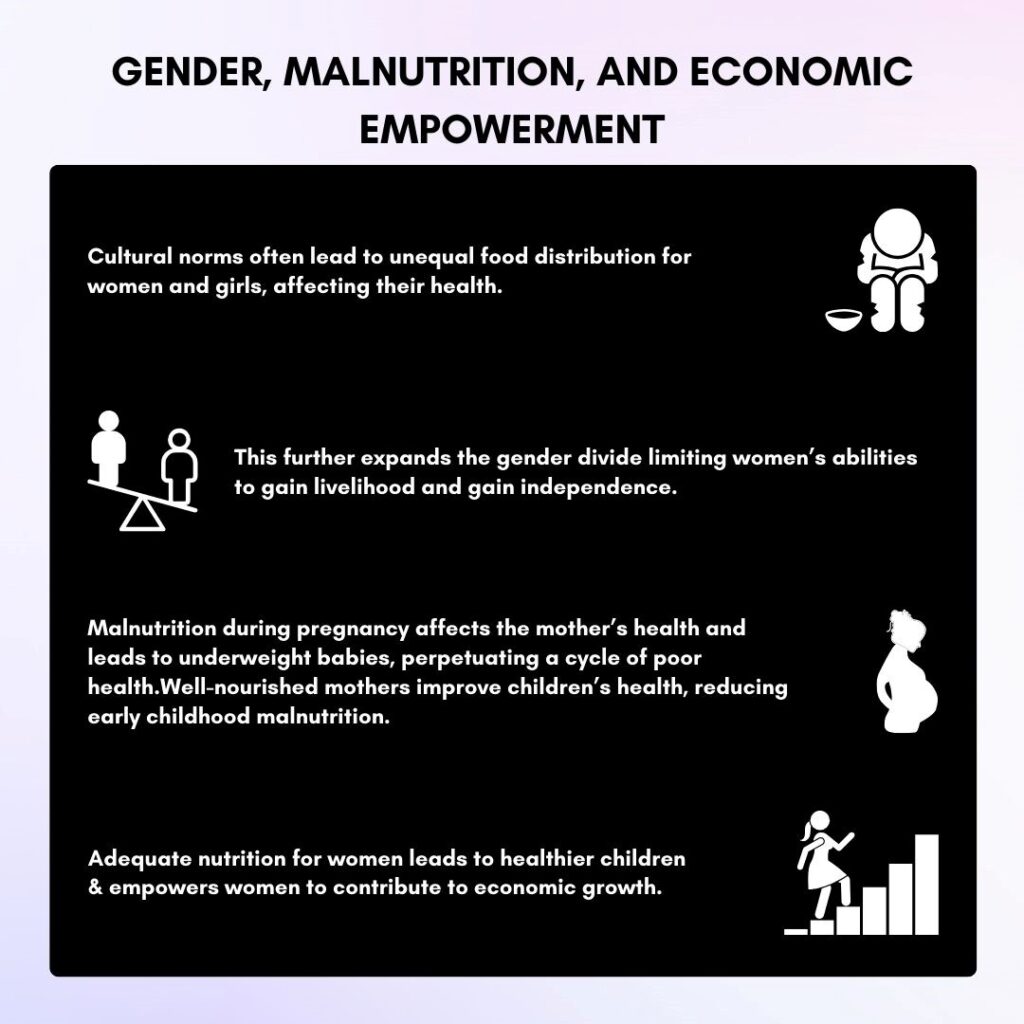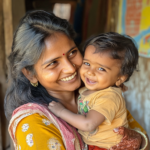In the rural landscapes of India, where entrenched traditions shape societal structures, the interplay of gender, malnutrition, and economic empowerment significantly influences the future.
Malnutrition, particularly among women and girls, creates a cycle of poor health, reduced productivity, and limited opportunities, perpetuating poverty. Tackling this issue requires a nuanced understanding of gender disparities and the powerful connection between nutrition and economic empowerment, emphasizing early childhood malnutrition as the foundation for enduring change.

Gender Disparities: Addressing Malnutrition Among Women and Girls
Women and girls in rural India face unique challenges when it comes to nutrition. Cultural norms and gender biases often lead to unequal food distribution within households, with women and girls receiving smaller portions or being the last to eat.
This disparity contributes to elevated rates of malnutrition among females, severely impacting their health and the well-being of future generations.
Pregnant and lactating mothers are particularly vulnerable; inadequate nutrition during these crucial periods can result in complications for both mother and child.
The Critical Role of Mothers in Combating Early Childhood Malnutrition
Mothers are the cornerstone of any child’s health and development. Their nutrition during pregnancy and lactation directly influences their child’s chances of survival, growth, and cognitive development.
Malnourished mothers are more likely to give birth to malnourished babies, perpetuating a cycle of poor health that can be difficult to break.

In this context, addressing maternal nutrition is essential to combating early childhood malnutrition. Ensuring mothers have access to nutritious food, healthcare, and education is crucial for preventing malnutrition in children from the outset.
Interventions targeting both mothers and children can create a powerful ripple effect, improving health outcomes for present and future generations.
Economic Empowerment: The Ripple Effect of Improving Women’s Nutrition
Enhancing the nutrition of women and girls has significant implications for community development and economic empowerment. Well-nourished women tend to be more productive both at home and in the workforce, directly contributing to the economic growth of their families and communities.
With access to adequate nutrition, women are better able to care for their children, support their education, and contribute to household income, which help break the cycle of poverty.
Moreover, improving women’s nutrition leads to broader social and economic benefits. Healthy women are more likely to engage in decision-making processes within their households and communities, fostering equitable and sustainable development.
As primary caregivers, women play a crucial role in shaping the future of their children, making their health and nutrition a critical factor in the fight against early childhood malnutrition.
Cultural Barriers: Navigating Gender-Based Obstacles in Nutrition Interventions
Cultural barriers often hinder efforts to enhance nutrition among women and girls in rural areas. Deeply ingrained gender norms can restrict women’s access to resources, education, and healthcare, complicating the implementation of effective nutrition programs.
Overcoming these challenges necessitates a culturally sensitive approach that respects local beliefs while advocating for positive change.
Many communities require education and awareness initiatives that challenge harmful practices and encourage a more equitable distribution of food and resources within households.
By collaborating closely with local leaders and enrolling community members to work within the program, organizations can ensure their programs are accepted and embraced by those they aim to support.
A Holistic Approach to Gender, Nutrition, and Empowerment
At the nexus of gender, nutrition, and economic empowerment lies the opportunity for transformative change.
ANNADA’s holistic approach to tackling malnutrition recognizes the essential role women play in shaping the health and future of their families and communities. By focusing on nutritional adequacy for children, lactating and pregnant mothers, and adolescent girls, ANNADA aims to disrupt the cycle of malnutrition that traps families in poverty.
Through culturally sensitive interventions, robust awareness programs, and partnerships with community members, ANNADA seeks to build support systems that empower women and safeguard society’s most vulnerable members—children.
By enhancing maternal nutrition and ensuring that women have the resources they need to thrive, ANNADA is committed to cultivating stronger, healthier communities where every child can realize their full potential.
Ending malnutrition requires collaboration, innovation, and a commitment to long-term solutions. As we continue this journey, it is crucial that we support programs that not only address immediate needs but also empower women to lead healthier, more productive lives.
In doing so, we can create a future where early childhood malnutrition is a thing of the past, and every child has the chance to thrive.
#FeedingSmart hashtag#ChildNutrition hashtag#ANNADA
hashtag #CSR hashtag#nutrition hashtag#malnutrition hashtag#health hashtag#SDG hashtag#hunger hashtag#corporatesocialresponsibility hashtag#ESG hashtag#impact hashtag#nourish hashtag#feedachild









